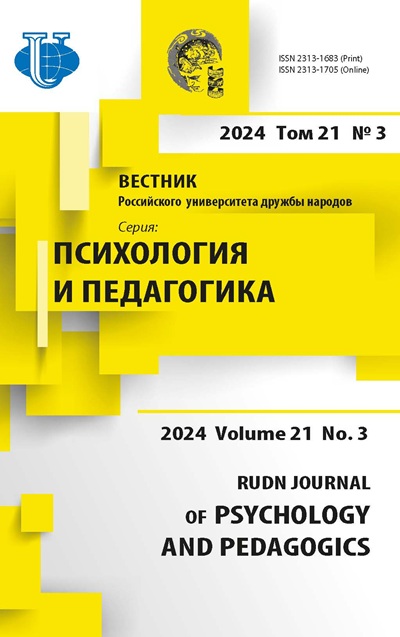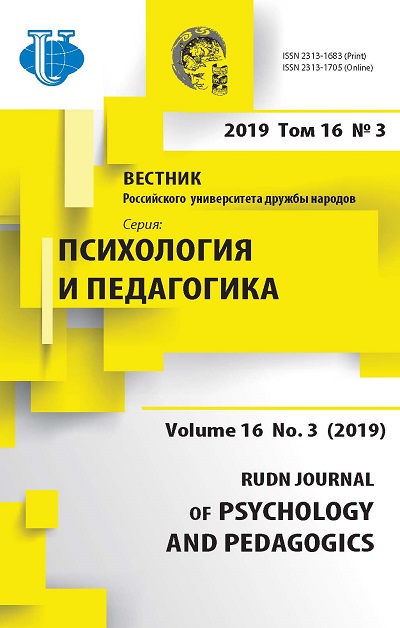Individual Educational Programs as New Mechanism of Integration between Higher Education and Labor Sphere
- Authors: Senashenko V.S1, Struchkova E.P1
-
Affiliations:
- Peoples’ Friendship University of Russia (RUDN University)
- Issue: Vol 16, No 3 (2019)
- Pages: 451-465
- Section: PROBLEMS OF MODERN UNIVERSITY EDUCATION
- URL: https://journals.rudn.ru/psychology-pedagogics/article/view/22140
- DOI: https://doi.org/10.22363/2313-1683-2019-16-3-451-465
Cite item
Full Text
Abstract
At present the problem of the integration between the higher education and the sphere of labor has become particularly urgent. It is noted that the attempts earlier made by a number of authors to solve the problem of the integration between the higher education and the labor sphere by combining educational and professional standards, as well as by harmonizing the requirements of the labor market for the qualifications of specialists and the competencies of graduates of higher education are facing significant difficulties. In this paper, we consider individual educational programs as one of the mechanisms of combining the higher education and labor. The analysis of the emerging differences between the higher education and the sphere of labor in the context of different educational models has been conducted. Thus, for example, within the framework of the professional model of the educational process organization, the possibilities of building individual educational programs are limited by the amount of labor intensity of the variable part of the educational program according to the field of study or subject specialism. At the same time, we are talking about professional individual educational programs, which are based on the processes of the formation of professional subjectivity of the student and the formation of his/her professional image. Such individual educational programs not only orient students on a certain type of work activity already at university, but also guarantee a well-grounded choice of the future profession. The paper focuses on the significant impact of the individualization of professional and professionalization of individual educational programs, as well as the multilevel structure of higher education on the nature of the integration of educational programs of higher education and the trajectories of professional development of young professionals. It is emphasized that the adaptation of students to the educational process, built on the principles of individualization of educational programs, is a key point of interdisciplinary psychological and pedagogical problems of the development of creative abilities of students and is accompanied by the mastery of new skills.
Keywords
About the authors
Vasiliy S Senashenko
Peoples’ Friendship University of Russia (RUDN University)
Author for correspondence.
Email: vsenashenko@mail.ru
Dr. Sci. (Phys.-Math.), is Full Professor, Professor, Comparative Education Policy Department
6 Miklukho-Maklaya St., Moscow, 117198, Russian FederationElena P Struchkova
Peoples’ Friendship University of Russia (RUDN University)
Email: elenastruch1988@gmail.com
PhD student, Comparative Education Policy Department
6 Miklukho-Maklaya St., Moscow, 117198, Russian FederationReferences
- Belotserkovsky, A.V. (2015). On coordination of educational and professional standards. Higher Education in Russia, (6), 26–31. (In Russ.)
- Blinov, V.I., Batrova, O.F., Jesenina, E.Yu., & Faktorovich, A.A. (2015). Professional standards: from development to application. Higher Education in Russia, (4), 5–13. (In Russ.)
- Blinov, V.I., Esenina, E.Yu., Klink, O.F., Rykova, E.A., & Faktorovich, A.A. (2016). The Occupational standards as a tool of the human resource management in the educational organization. Higher Education in Russia, (10), 16–23. (In Russ.)
- Karavaeva, E.V. (2017). Qualifications of higher education and professional qualifications: Harmonization with efforts. Higher Education in Russia, (12), 5–12. (In Russ.)
- Korshunov, S.V. (2018). The system of standardization of education in the Russian Federation celebrates a quarter of a century. Higher Education in Russia, (3), 23–37. (In Russ.)
- Mineev, P., & Solovyova, T. (2010). Realization of the individual educational trajectories on the basis of the state standards of the third generation. Higher Education in Russia, (7), 44–47. (In Russ.)
- Pak, Yu.N., Nuguzhinov, Zh.S., Pak, D.Yu., & Yamanov, М.Yu. (2018). Institutional aspects of conjugation between educational and professional standards. Alma Mater (Higher School Herald), (10), 4–7. (In Russ.)
- Pilipenko, S.A., Zhidkov, A.A., Karavaeva, E.V., & Serova, A.A. (2016). On the correlation between federal educational standards of higher education and professional standards: problems, possible approaches, recommendation on actualization. Higher Education in Russia, 6, 5–15. (In Russ.)
- Prokhorov, V.A. (2018). Professional standard and federal state educational standard for undergraduate programs. Higher Education in Russia, (1), 31–36. (In Russ.)
- Pryanishnikova, O.D., & Leubovich, A.N. (2008). Professional standards: a brief overview of foreign experience. Promyshlennik Rossii, (3), 37–41. (In Russ.)
- Senashenko, V.S. (2015). On the correlation between professional standards and federal educational standards of higher education. Higher Education in Russia, 6, 31–36. (In Russ.)
- Senashenko, V.S. (2017). Formation of professional standards as the basis of personnel decisions of the professional community. Rector of the University, (3), 30–35. (In Russ.)
- Senashenko, V.S. (2018). Conjugation levels between higher education and labour sphere. Higher Education in Russia, (3), 38–47. (In Russ.)
- Senashenko, V.S. (2018). Legal framework of higher education in Russia needs reconfiguration. Higher Education in Russia, (4), 48–56. (In Russ.)
- Senashenko, V.S., & Struchkova, E.P. (2019). Educational model is an important factor of influence on conjugation higher education with labor sphere. Higher Education in Russia, 4, 9–20.
- Sevostyanov, D.A. (2018). Educational standards and the crisis of education. Higher Education in Russia, (4), 57–65. (In Russ.)
- Shekhonin, A.A., Tarlykov, V.A., Voznesenskaya, A.O., & Bakholdin, A.V. (2017). Harmonization of qualifications in higher education and in the job market. Higher Education in Russia, (11), 5–11. (In Russ.)
- Solovyev, V.P., & Pereskokova, T.A. (2017). Educational and professional standards: challenges, common grounds, engineer training prospects. Higher Education Today, (5), 2–8. (In Russ.)
- Temnova, L.V., & Lizunova, O.A. (2017). Factors of formation of university graduates’ career trajectories. Higher Education in Russia, (11), 89–97. (In Russ.)
- The Federal Law of the Russian Federation No. 273-FZ of December 29, 2012 “On Education in the Russian Federation”. (In Russ.)
- The Labor Code of the Russian Federation. Article 195.1. The concepts of employee qualification, professional standard (introduced by Federal Law of 03.12.2012 No. 236-FZ). (In Russ.)
- Tukachev, Yu.A. (2003). Educational and professional standards: search for theoretical and methodological grounds. Psychology of Professional and Educational Space of Personality: collection of scientific articles (pp. 142–148). Yekaterinburg, 2003. (In Russ.)
- Verbitskiy, A.A. (2017). Categorical apparatus of the theory of contextual education. Higher Education in Russia, (6), 57–67. (In Russ.)
- Vorobieva, O.V., & Teleshova, I.G. (2018). Research activities in the European Qualifications System: Experience and Problems. Higher Education in Russia, (5), 74–86. (In Russ.)
















